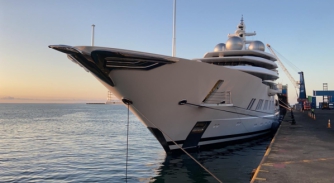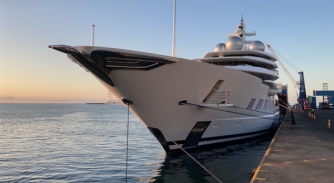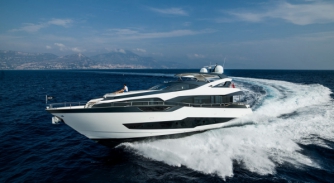What does “choice-of-forum” mean for yacht insurance?
A recent US Supreme Court ruling on marine insurance policies has flagged numerous new legal considerations for American yacht owners…

The recent US Supreme Court ruling on marine insurance policies has introduced a raft of new legal considerations, potentially affecting their insurance coverage and claims process. So, what does this mean for yacht owners in the US?
This decision arose from a case involving a yacht owner who submitted a claim for damages after the vessel ran aground off the coast of Florida. Speaking with SuperyachtNews, Thomas Ptacek, Senior Vice President, Lockton Companies explains that whilst the ruling isn’t necessarily a watershed moment for marine insurance overall, it does require heightened attentiveness from insurers and owners.
“The case basically addressed a “choice of law” issue in a marine insurance policy which didn’t contain a precise jurisdiction clause,” says Ptacek. “It behoves marine insureds to pay attention to these clauses to be sure they understand which laws would be applied to policy disputes, to attempt to ensure the most favourable jurisdiction.”
The case, Great Lakes Insurance SE v. Raiders Retreat Realty Co, involved a dispute over a marine insurance policy purchased by Raiders Retreat Realty from Great Lakes Insurance, which specified that U.S. admiralty law or New York law would apply in any litigation.
When a boat insured under the policy ran aground in Florida, Raiders submitted a claim, which Great Lakes denied, citing non-compliance with the boat’s fire suppression system as a breach of warranty, even though no fire had occurred onboard. Based on unrelated policy compliance issues, such denials are not uncommon as insurers frequently invoke “breach of warranty” to reject claims.
Great Lakes sued Raiders in Pennsylvania, applying New York law per the policy terms. Raiders argued that Pennsylvania law should apply, claiming that enforcing New York law violated Pennsylvania’s public policy.
The crux of the issue in this case was the “choice-of-forum” clause, which pertains to whether insurers can specify the jurisdiction in which legal disputes must be adjudicated. The insurer chose a jurisdiction with a history of rulings that favour breach of warranty denials, thereby complicating the policyholder's ability to challenge the denial.
The Supreme Court upheld the enforceability of “choice-of-forum” provisions under maritime law, siding with the insurance carrier. This ruling reinforces the predictability of policy term interpretations under maritime law, a critical aspect given the inherent mobility of yachts as an asset class.
This decision also grants insurers the ability to select advantageous jurisdictions, typically opting for states such as New York. Although New York law generally prohibits the denial of claims based on unrelated breaches of warranty, it exempts marine insurance policies from this rule. This exemption creates a complicated legal environment for yacht owners.
In terms of how this would be treated elsewhere, Ptacek explains that the flexibility of the choice of forum is unlikely to be seen in other countries. “Generally, UK law is more stringent than US/state law regarding application of jurisdiction rules,” he says. “It would be hard to comment on their treatment under EU laws too. Generally, though, careful consideration will benefit the insured.”
For policyholders, this ruling illustrates the importance of understanding and negotiating choice-of-law provisions in their insurance policies. It also highlights the need to clearly identify policy warranties, as breaches can void coverage regardless of a direct link to the cause of loss.
To tackle these complexities, Ptacek recommends that owners should seek marine support from insurance brokers, who review existing insurance contracts to identify potential gaps or areas of concern. This examination could lead to newly created insurance contracts or modifications to existing ones, ensuring they better meet the owner’s needs and preferences.
While insurance policies are under review, taking proactive steps to minimise potential risks is paramount, with investing in advanced safety measures, conducting regular maintenance checks, and adhering to maritime regulations as crucial. Maintaining accurate records of all correspondence and policy documents is also vital. A well-documented paper trail is invaluable in disputes, helping to defend claims and facilitate resolution.
Yacht owners also need to be aware of specific technicalities such as the inclusion of specific terms related to the condition and maintenance of equipment onboard. Regular inspections and adherence to specified maintenance schedules as outlined in the insurance policy are also key. Ensuring that all safety systems, such as fire suppression equipment, are fully operational and compliant with policy terms can mitigate the risk of claim denials based on technicalities.
“The basic proposition is that marine insurance contract interpretation is more stringent than in other lines of insurance, and that warranties which affect whether coverage applies are relatively strictly enforced,” adds Ptacek. “Most policies contain the relevant explicit warranties and it is always good to examine them at inception and to make sure that all parties to the contract understand what they mean and the extent to which they may abrogate coverage.”
The Supreme Court ruling shows the importance of having robust, well-negotiated insurance policies and being prepared to manage potential legal challenges. Yacht owners and insurers must remain vigilant and well-informed to effectively protect their assets. By proactively addressing potential issues and maintaining thorough documentation, yacht owners can better face the challenges of marine insurance and ensure they are adequately covered in the event of a claim.
Profile links
NEW: Sign up for SuperyachtNewsweek!
Get the latest weekly news, in-depth reports, intelligence, and strategic insights, delivered directly from The Superyacht Group's editors and market analysts.
Stay at the forefront of the superyacht industry with SuperyachtNewsweek
Click here to become part of The Superyacht Group community, and join us in our mission to make this industry accessible to all, and prosperous for the long-term. We are offering access to the superyacht industry’s most comprehensive and longstanding archive of business-critical information, as well as a comprehensive, real-time superyacht fleet database, for just £10 per month, because we are One Industry with One Mission. Sign up here.
Related news

Is the auction above board?
With negotiations underway for Royal Romance to be sold at an American auction house, a Ukrainian law expert offers insights on the contentious move
Fleet

The value of the lawyer
The approach to seeking advice needs to evolve, as does the perception of a lawyer’s role within the decision-making process
Business

US aims to sell Amadea
Amadea could be sold by the US government as it looks to free itself from a seven-figure maintenance bill
Fleet

IGY to build new US marina
The superyacht marina specialists have confirmed the development of a new marina in the US and a Balearic regeneration project
Business

Political motives or legal grounds?
A former Rosneft CEO is contesting the legality of Amadea’s seizure in a New York Court, claiming that he is its true owner
Owner

Rolls-Royce inaugurates US overhaul centre
The mtu Aiken campus now covers the full circle of life for an mtu engine – from concept to its second-life
Crew
Related news
Is the auction above board?
2 years ago
The value of the lawyer
2 years ago
US aims to sell Amadea
2 years ago
IGY to build new US marina
2 years ago
Political motives or legal grounds?
2 years ago
Rolls-Royce inaugurates US overhaul centre
2 years ago
NEW: Sign up for
SuperyachtNewsweek!
Get the latest weekly news, in-depth reports, intelligence, and strategic insights, delivered directly from The Superyacht Group's editors and market analysts.
Stay at the forefront of the superyacht industry with SuperyachtNewsweek



